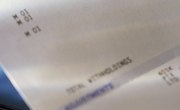
When you start working for an employer, you must fill out a W-4 form so your employer knows how much to withhold. At the end of the year, your employer reports the amounts taken out of your paycheck on your Form W-2 so you know how much to report on your taxes. However, in some cases, you can claim you are exempt from the federal income tax withholding.
Claiming tax exempt status means that no federal income taxes will be withheld from your paycheck. That being said, the IRS maintains very stringent requirements for those claiming exempt status. Always review these requirements before claiming exempt in order to ensure you don't receive excessive fines or penalties.
Exempt Tax Meaning
The IRS only allows you to claim that you're exempt from income tax withholding if you meet two conditions. First, you can't have owed any income taxes for the prior year. Second, you must expect not to owe any taxes for the current year.
When the IRS says you don't owe any taxes, it doesn't just mean that you received a refund – it means that your tax liability, before counting any withholding, was $0. For example, if you had $500 withheld and got a $200 refund, that doesn't mean you didn't owe anything, it just means you only owed $300, which was less than you had withheld.
Effects of Being Exempt
When you submit a W-4 that shows you're exempt from withholding, your employer won't take out any money for federal income taxes from your paychecks. So, your take-home pay will be a little more than it would be if taxes were withheld. However, the exemption doesn't extend to payroll taxes – Social Security or Medicare taxes – so those will continue to be withheld. When you receive your W-2 at the end of the year, it will show $0 withheld for federal income taxes.
Misconceptions of Being Exempt
Claiming "exempt" on your withholding, even when you do it legally, doesn't mean you're exempt from owing any taxes for the year, just that you're exempt from withholding. If your financial circumstances change and you do earn enough to owe taxes, you're going to have to pay out of pocket because your employer hasn't withheld any money throughout the year.
For example, say you were only working part-time, but your hard work paid off and you got a full-time gig and a raise halfway through the year – you might owe taxes. If you experience a substantial increase in income, it would be wise to change your W-4 and start having income withheld. For example, if you do the transition from part-time work to working full time and you get a raise at the same time, the combination of additional hours and a higher pay rate could easily change your exempt status.
Another example is if you start to pick up shifts or work a lot of overtime. That could also change your exempt status. A change of your exemption status on your W-4 could be the difference between the IRS issuing you a check, or you sending one to them.
Understanding the Time Frame
If you claim exempt on your W-4, it's only good for one year. If you're still eligible to claim exempt the following year, you need to fill out another W-4 and give it to your employer. According to IRS Publication 15, the claim of being "exempt" on the W-4 from the previous year expires on Feb. 15, so if you haven't submitted a new one, your employer starts withholding money from your paychecks on Feb. 16.
If you later submit a new W-4 claiming you're still exempt, your employer will stop withholding additional amounts, but you'll have to file a tax return at the end of the year to get back any funds already withheld.
References
- Internal Revenue Service: Tax Withholding for Individuals
- Internal Revenue Service: Publication 15, Employer's Tax Guide
- IRS. "(Circular E), Employer's Tax Guide." Page 21. Accessed June 13, 2020.
- Social Security Administration. "What Is FICA?" Accessed June 13, 2020.
- IRS. "FAQs on the 2020 Form W-4." Accessed June 13, 2020.
Writer Bio
Based in the Kansas City area, Mike specializes in personal finance and business topics. He has been writing since 2009 and has been published by "Quicken," "TurboTax," and "The Motley Fool."

